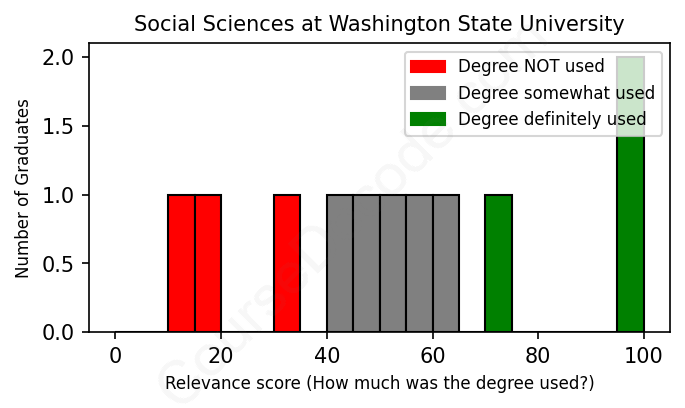
First, some facts. Of the Social Sciences graduates from Washington State University we've analyzed , here's how many have used (or NOT used) their degree in their career:

These are estimates based on AI analysis of 11 LinkedIn profiles (see below).
The verdict? Significantly below average. Overall, with an average relevance score of 53%, Social Sciences graduates from Washington State University have a much lower likelihood (-14%) of finding work in this field compared to the average graduate across all fields:
And for comparison, here's the chart for all profiles we've looked at across all degrees.
Also, after graduating, only 27% of these graduates have pursued further education other than another Bachelor's degree (such as a Masters degree or other), compared to the average across all profiles of 35%. This suggests a Bachelors degree is enough for most Social Sciences graduates, and it's normal to look for work straight after graduation.
See the details:
|
Relevance score: 50% We think this person has gone into a career only somewhat relevant to their degree. We think this person has gone into a career only somewhat relevant to their degree.
DEGREE INFOGraduated in 2012 from Washington State University with a Bachelor's degree in Social Sciences. No other secondary education since. JOB HISTORY SINCE GRADUATIONFinancial Re-enforcement Officer State of Washington Feb 2020 - Present ABOUTBusiness professional experienced in managing simultaneous projects with competing priorities and changing deadlines.-Highly dedicated and self-motivated individual with demonstrated leadership potential, strong interpersonal communication skills, and excellent teamwork.-Ability to work effectively within high-pressure and fast-paced environments with a demonstrated history of working in the government administration industry. -Skilled in Social Services, Case Management, and Training. -Strong business development professional with a Master of Science- MS focused in Human Services. |
The top 10 most common jobs done by the graduates we've analyzed (ranked most common to least) are:
After looking at the job paths of people who graduated with a degree in Social Sciences from Washington State University, it seems like many of them have gravitated toward roles in fields like law, social services, and management. For example, positions such as Paralegal, Child Protective Services Investigator, and various roles in community service suggest a strong alignment with key social science principles. These jobs often require an understanding of human behavior, social dynamics, and community needs, all of which are central to social sciences. However, there are also a significant number of graduates who have taken on roles that are more business-oriented or focused in areas like retail and logistics, where the connection to their degree seems more tenuous.
Overall, while many alumni do find themselves in positions that require the skills and knowledge acquired through their social science studies, a good chunk of jobs listed—like those in retail management or financial services—do not directly align with the principles of social sciences. It appears that while the degree offers a versatile skill set, the job market sometimes leads graduates into roles that don’t fully utilize their education. This is pretty common across all fields and can depend heavily on individual interests and the specific experiences each graduate has after school.
Here is a visual representation of the most common words in job titles for Social Sciences graduates (this is across all Social Sciences graduates we've analyzed, not just those who went to Washington State University):

Graduates from Washington State University's Social Sciences program seem to be carving out a diverse range of career paths. Many of them land their first jobs in roles that are at least somewhat related to their degree, like law office assistants, paralegals, and even positions in social services or community programs, such as AmeriCorps. However, as we look at their careers a few years post-graduation, we start to see a mix. Some individuals transition into roles that still align with social sciences, like case managers, while others shift into unexpected fields like logistics or real estate. It’s a bit of a mixed bag, showing that while some graduates stay rooted in the realm of social sciences, others branch out into different sectors.
Fast forward 5 to 10 years, and it appears that a number of these graduates find themselves in fairly stable or even impressive positions, some managing teams or leading projects in corporate settings. However, there are also signs that not every grad is in a job that feels super relevant to their studies. For instance, certain people have taken on roles like store managers or have pivoted into logistics, which don’t directly relate to social sciences. In conclusion, while many graduates leverage their degrees well in meaningful careers, it's clear that the flexibility of a social sciences degree opens doors to a wider array of industries, making the career outcomes quite varied. Overall, it seems like graduates from this program have the potential to pursue rewarding careers, but the journey can be pretty different for each individual.
Getting a Bachelor’s degree in Social Sciences at Washington State University is about average in terms of difficulty. It’s not a walk in the park, but it’s also not as tough as some hardcore STEM majors. You’ll dive into a mix of subjects like sociology, psychology, and political science, which means you'll be doing a lot of reading, writing, and group work, but if you stay organized and engaged, you can totally handle it. The professors are generally supportive and there are plenty of resources to help you out. So if you’re curious about people and society, you’ll probably find it interesting, and that can make the work feel a bit easier!
Most commonly, in the LinkedIn profiles we've looked at, it takes people 3 years to finish a Bachelor degree in Social Sciences.
Looking at the careers of these Washington State University grads, it seems like they're doing alright, but it really varies depending on the field. Some, like the Logistics Officer at Tesla and the Multi Site Warehouse Leader, likely pulled in decent salaries, especially with a company like Tesla on their resume. Others, like those in social work or teaching roles, might be on the lower end of the pay scale, which is pretty common in those fields. It's also clear some have bounced around a lot before finding their footing, especially in roles like case management or education. Overall, while some are probably making good money, others might be struggling a bit more, typical for many college grads entering the workforce.
Here is a visual representation of the most common words seen in the "about" section of LinkedIn profiles who have a Bachelor degree in Social Sciences (this is across all Social Sciences graduates we've analyzed, not just those who went to Washington State University). This may or may not be useful:

Here are all colleges offering a Bachelor degree in Social Sciences (ordered by the average relevance score of their Social Sciences graduates, best to worst) where we have analyzed at least 10 of their graduates:
| College | Score | Count |
|---|---|---|
 Portland State University Portland State University
|
72 | 27 |
 University of Maryland University College University of Maryland University College
|
63 | 10 |
 Kansas State University Kansas State University
|
54 | 13 |
 Washington State University Washington State University
|
53 | 11 |
 Ashford University Ashford University
|
51 | 27 |
 Florida State University Florida State University
|
49 | 11 |